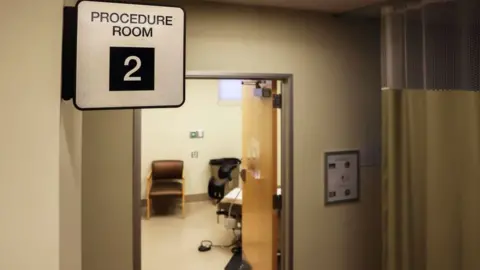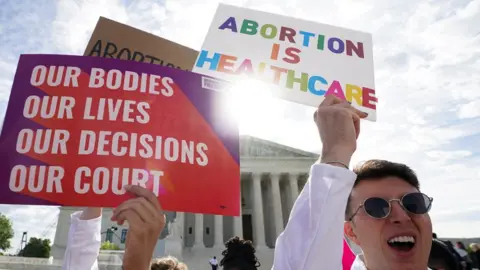The federal law driving the latest abortion battle at the US Supreme Court
The US Supreme Court has heard arguments about how close to death a woman must be to receive an abortion in states with strict bans.
The case, one with potentially sweeping consequences for emergency rooms across the country, centres on a federal law requiring hospitals to provide stabilising treatment to any patient who arrives with an "emergency medical condition".
The question before the Supreme Court now is whether that law, called the Emergency Medical Treatment and Labor Act or EMTALA, covers emergency abortions, even in states where the procedure is banned. In other words: if a doctor determines an abortion is the best treatment for a patient in jeopardy, are they protected from prosecution, no matter where they are?
The Biden administration has said yes. It has sued Idaho over its near-total abortion ban, which has an exception for the life - but not the health - of the mother.
"Women should not have to be near death to get care," said Department of Health and Human Services Secretary Xavier Becerra in a statement announcing the suit.
Idaho has countered, saying EMTALA cannot supersede its state law.
The Supreme Court's conservative majority seemed unconvinced that EMTALA could supersede Idaho's state ban.
But the three liberal female justices sounded highly sceptical of Idaho's argument, raising examples of women facing severe health complications who were denied abortions because of bans.
Here is a look at the arguments, and what's at stake.
What is EMTALA?
Congress enacted the law in 1986 to ensure all patients would receive a basic standard of emergency care, regardless of their insurance status or their ability to pay. It was meant to stop patient "dumping", a practice of transferring uninsured patients to public hospitals, regardless of the health consequences.
The law demands that all hospitals receiving Medicare funding - most hospitals in the US - provide stabilising treatment to any patient who arrives at the hospital's emergency room with an "emergency medical condition".
 Getty Images
Getty ImagesThat goes beyond fatal conditions to include those that put a person's health "in serious jeopardy" or cause "serious impairment to bodily functions" or "any bodily organ".
Doctors and hospitals violating the law may face fines and loss of federal funding.
What does EMTALA have to do with abortion?
The law's text does not specifically mention abortion, or name specific treatments for different emergency conditions. It just asks that providers use accepted standards of care for each patient.
But when the Supreme Court overturned Roe v Wade in 2022, the Biden administration issued a memo saying that EMTALA covers cases where an abortion is needed to stabilise a patient.
"When state law prohibits abortion and does not include an exception for the life of the pregnant person - or draws the exception more narrowly than EMTALA's emergency medical condition definition - that state law is pre-empted," the memo said.
Leading medical groups like the American Medical Association and the American Hospital Association, have agreed, telling the Supreme Court in an amicus brief that under EMTALA, abortions may be provided as necessary stabilising care.
How does this apply to Idaho?
Shortly after Roe was overturned, Idaho's Defense of Life Act became law. It banned abortion from the point of conception in almost all cases, and made performing or assisting in an abortion a felony crime, punishable by up to five years in prison.
The law has an exception to prevent the death of the pregnant person. But it does not make exceptions for threats to the mother's health, or for long-term medical complications.
The bill's sponsor, Republican state Senator Todd Lakey, said during one debate that the health of the mother "weighs less, yes, than the life of the child", referring to the foetus.
 Getty Images
Getty ImagesIn August 2022, the Department of Justice sued Idaho, saying its ban violated EMTALA because it does not have an exception for the health of the mother.
Idaho's law blocks abortions "even when a doctor determines that abortion is the medically necessary treatment to prevent severe risk to the patient's care", the justice department wrote in a court filing.
According to EMTALA's own wording, if a "direct conflict" exists, EMTALA must supersede state law.
The Supreme Court has allowed Idaho's ban to remain in place while it considers the case.
What is Idaho's argument?
Lawyers for Idaho have argued that EMTALA does not cover abortion, and does not authorise physicians to perform a procedure that is otherwise illegal.
"A patient who wanted, but was denied, an abortion cannot wield EMTALA to force an emergency room to perform one, neither can the federal government," they wrote in the state's Supreme Court brief.
And there is no conflict between the Idaho ban and the federal protection, as both seek to protect the lives of women and their "unborn children", they also wrote.
"This case is all about the Biden administration manipulating EMTALA to override Idahoans' choice to preserve life," said John Bursch, senior counsel with the Alliance Defending Freedom, a conservative legal advocacy group representing the state.
What is at stake?
Idaho's physicians have said the ban has already harmed women who were denied care while suffering from serious pregnancy complications.
A group of 678 doctors in Idaho filed a brief that described several cases of women facing high risks of infection, sepsis, kidney failure and infertility who were either sent home from the hospital or transferred out of state to receive care.
And physicians say they are now working under immense stress, afraid they will have to turn away patients experiencing emergencies or risk the loss of their license or even a prison sentence.
"There's a lot of fear on our teams that goes beyond the doctors," said Caitlin Gustafson, a family doctor and obstetrician in McCall, Idaho, adding that nurses and other healthcare providers could be implicated too.
Reports suggest that pressure has driven doctors out of the state. Since the abortion ban came into effect, almost a quarter of Idaho's obstetricians have left, according to a report from the Idaho Physician Well-Being Action Collaborative.
Anti-abortion activists have said doctors are wilfully misinterpreting the law, which allows for life-threatening cases.
"It's histrionics and grandstanding," said John Bursch, of the Alliance Defending Freedom. "There is no flood of doctors fleeing the state because Idaho protects life."
What did the Supreme Court say?
On 24 April, the nine justices heard arguments from Josh Turner, of the Idaho Attorney General's office, and Elizabeth Prelogar, the US Solicitor General.
Mr Turner faced a barrage of sometimes cutting questions from the three liberal justices - Sonya Sotomayor, Elena Kagan and Ketanji Brown Jackson - who all seemed doubtful that Idaho could, under EMTALA, deny abortions to pregnant women facing serious health concerns.
Federal law "says that you don't have to wait until the person is on the verge of death", Justice Kagan said.
Justice Amy Coney Barrett, a conservative who voted to overturn Roe v Wade, also chimed in at points, saying she was "shocked" that Mr Turner could not say definitively whether Idaho's doctors could perform abortions in cases where women faced serious health risks such as loss of fertility.
But most of the conservative justices indicated they were sympathetic to Idaho's case, that doctors could not be compelled to break state law because of EMTALA.
"How can you impose restrictions on what Idaho can criminalise?" Justice Alito asked.
And some of the conservative justices, Justice Alito in particular, seemed open to accepting arguments of "foetal personhood", the notion that a foetus, or unborn child, would have the same rights as a pregnant woman.
A ruling is expected this summer.
With additional reporting by Rebecca Hartmann and Nomia Iqbal
